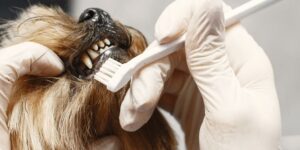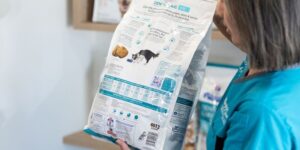Constant paw licking can create much stress for both your doggo or kitty and their owner. So what are the causes of paw licking and how can it be addressed?
Jasper’s Paw Licking Story
Jasper, a one-year-old Cocker Spaniel, just couldn’t stop licking at his paws. After a particularly sleepless and irritating night for both Jasper and his owner Ben (where Ben felt just about ready to crack if he heard one more licking sound), Ben booked Jasper in for a check-up with his regular veterinarian, Dr Jess.
Vet Consultation & Diagnosis
Dr Jess started the consultation by asking some detailed history questions. She found that Jasper was already on an excellent program of parasite prevention. Jasper had started licking his paws a few weeks ago as the spring weather was warming up, and was also rubbing at his face and ears a lot too.
Dr Jess examined Jasper and found him to have inflamed, irritated paws and ears.
Surface skin and ear discharge samples, examined under the microscope, showed that Jasper was suffering from a yeast overgrowth on his paws, and bacterial and yeast infections of both ears.
Paw Licking Treatment Plan for Jasper
Dr Jess sent Jasper home with a medicated shampoo for his paws, medicated ointment for his ears and a short course of anti-inflammatories. However, she discussed with Ben a suspicion that Jasper could possibly have an underlying allergy causing his problems (which were resulting in secondary infections due to a weakened skin barrier), so advised him to return if Jasper became itchy again once the medications ceased.
Jasper’s symptoms resolved fully, but a week or so after the medications finished, he started licking his paws again. Ben booked Jasper in for a recheck consultation with Dr Jess to discuss further the possibility of allergies.
Paw Licking and Allergies
Dr Jess explained to Ben that there are four main types of allergies in pets:
- Flea allergy
- Atopy (allergies to airborne materials, such as pollens or moulds)
- Food allergies
- Contact allergies (from direct contact with certain plants or chemicals)
As Jasper was already on effective parasite prevention, Dr Jess felt that a flea allergy was unlikely. Dr Jess was most suspicious of atopy, given that Jasper’s symptoms started in spring and he had a suggestive combination of paw and ear irritation.
However, it was important to rule out a food allergy first, which pets can develop even whilst eating a consistent diet.
Ruling Out Food Allergies
Jasper was trialled on a strict prescription hypoallergenic diet for 10 weeks, but required several courses of “rescue” anti-itch medications during this time to relieve his symptoms. He showed no improvement on the special diet, so was deemed unlikely to be food allergic.
Atopy Identified
With atopy now seeming the most likely cause of Jasper’s problems, Dr Jess discussed the options of either referral to a specialist dermatologist vet for potential immunotherapy treatment (anti-allergy “vaccines”) or long-term, regular medical management of his symptoms. Ben elected medical management.
Throughout the warmer times of the year, Jasper now receives regular itch-relieving injections with Dr Jess. He is also treated regularly at home with a medicated shampoo to control yeast and bacteria, a skin-soothing conditioner and an essential fatty acid supplement.
Jasper’s Progress
Ben is delighted to report that Jasper is now very comfortable and Ben himself is no longer woken up by those eye-twitchingly, irritating licking noises. Win-win!
Is Your Fur-kiddie Constantly Paw Licking?
If, like Jasper, your pet shows symptoms of recurrent skin or ear irritation, see our skin-savvy vets to discuss effective treatment options. Book online or Call.
We’ll help ban that bedtime itchiness for good!







